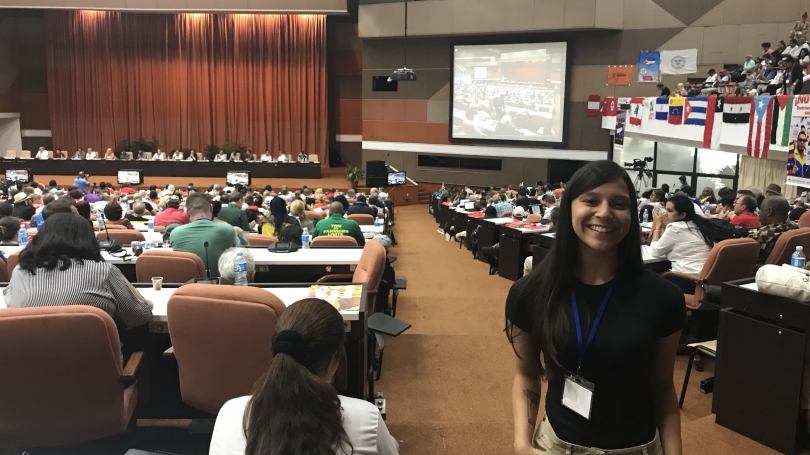
- Public Policy
- Leadership
- Funding
- News & Events
- About the Center
Back to Top Nav
Back to Top Nav
Back to Top Nav
Back to Top Nav
Attending the Anti-Imperialist Meeting of Solidarity, for Democracy and Against Neoliberalism in Cuba’s capital city was a once-in-a-lifetime experience. From the events related to the presidential election in Bolivia to the well-known problems faced by Venezuela, there is much currently going on in Latin America. I would be sufficiently glad about the opportunity of encountering Latin American people in such a context to discuss about these troubled events and what they represent for democracy in their respective nations. That this encounter occurred in a socialist country historically marked by its tense relation with the United States and involved people from all over the world, then, constitutes an experience I will never forget. I learned a lot at the Meeting, both from speakers and from the other attendees I met during coffee breaks, lunch, or at the small bookshop that was set up near the plenary room.
On the first day of the event, many speakers emphasized the need to identify the challenges currently faced by progressive forces in the Americas in order to not only renew their strategies but also to rethink their goals. In his talk, Cuba’s Minister of Foreign Relations, Bruno Rodríguez Parrilla, called the attention to Latin America’s dependence on the U.S. for the online traffic of digital information. He also associated the widespread circulation of fake news on social media platforms in destroying left-wing projects and political campaigns, citing Brazil’s last presidential election as an example. The most meaningful contribution of his talk, however, pertained to the political, economic, and diplomatic effects of the U.S. blockade on Cuba. As someone who has been living in the Island since August, it would not be exaggerated to say that I had already experienced many of them firsthand. The blockade is not an abstract normative measure whose effects are restricted to the Cuban government. On the contrary: I am convinced that the country’s citizens are the ones most affected by it as the food, petroleum, and other basic living products shortages are immediately and drastically felt by all portions of society. Mrs. Parrilla’s talk expanded my understanding of the topic by covering the macroeconomic implications of the embargo and the policy changes it has produced in Cuba’s international relations.
Another profoundly insightful discussion explored a possible intellectual endeavor to dismantle the theories that inform the actions of progressive forces, especially Marxism. Although this idea sounds almost conspiratorial, it can actually provide an interesting reflection on the relationship between the production of knowledge in higher education and policymaking, public discourse, and activism. I would not say that there is an attempt to dismantle what can be called classical political and sociological theories, but a certain detachment from them might indeed be occurring, as suggested by the academic programs of many universities in the U.S. A Sociology student, for example, may graduate having never read Marx, Weber, or Durkheim. Surely, this fact does not determine one’s professional quality, but it does have implications for the level of innovation in the knowledge being produced. After all, social and political scientists cannot challenge paradigms and develop truly groundbreaking theories if they do not know what have remained unquestioned throughout history.
The above is only a few of the reflections that the Anti-Imperialist Meeting allowed me to have, but they illustrate pretty well the reason why I believe it was a valuable experience. Undoubtedly, I will come back to the U.S. with a new, deeper understanding of the numerous social movements, labor unions, and left- wing parties that compose the complex political spectrum of the American continent and their equally complex agenda.
-Submitted by Juliana Arevalos Bordao '22, Rockefeller Center Mini Grant Recipient
The Rockefeller Center's Mini-Grants program funds registration fees for students attending conferences, as well as the costs of bringing guest speakers to Dartmouth. The views and opinions expressed here are the author’s own and do not necessarily represent the views and opinions of the Rockefeller Center or constitute an endorsement by the Center.